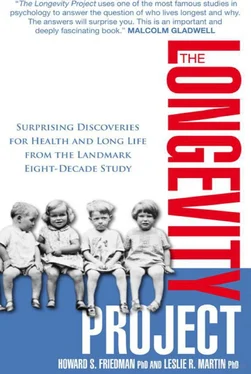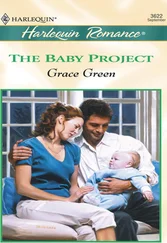Perhaps the issue wasn’t stress, but coping. Among the Terman children, being moody in childhood was relevant to increased mortality risk for boys but not for girls. 86 86 Our initial report on the importance of stable moods for boys is in J. E. Schwartz, H. S. Friedman, J. S. Tucker, C. Tomlinson-Keasey, D. Wingard, and M. H. Criqui, “Sociodemographic and Psychosocial Factors in Childhood as Predictors of Adult Mortality,” American Journal of Public Health 85 (1995): 1237-45.
Similarly, later in life it was the Terman men who had experienced mental difficulties and breakdowns who were at greatest risk for earlier mortality. 87 87 For more information on the relationship between mental difficulties and mortality risk see L. R. Martin, H. S. Friedman, J. S. Tucker, J. E. Schwartz, M. H. Criqui, D. L. Wingard, and C. Tomlinson-Keasey, “An Archival Prospective Study of Mental Health and Longevity,” Health Psychology 14 (1995): 381-87.
Stereotypes would suggest that these men were coping by using typically masculine unhealthy mechanisms like heading out to the bar. It turned out, however, that differences in coping with stress through smoking and drinking alcohol did not explain the mortality discrepancies.
What did masculine and feminine personalities dictate in terms of social ties? The idea was that moody women or those struggling with mental health issues might be better able to garner resources by letting others know about their problems. In general, women report more symptoms of ill health (both physical and mental), seek more care than do men, and are more ready to admit when they need help. 88 88 More on sex differences in health are in the following three articles: C. M. Gijsbers van Wijk, K. P. van Vliet, A. M. Kolk, and W. T. Everaerd, “Symptom Sensitivity and Sex Differences in Physical Morbidity: A Review of Health Surveys in the United States and the Netherlands,” Women and Health 17 (1991): 91-124; L. M. Verbrugge, “The Twain Meet: Empirical Explanations of Sex Differences in Health and Mortality,” Journal of Health and Social Behavior 30 (1989): 282-304; and K. S. Rook, S. T. Charles, and J. Heckhausen, “Aging and Health,” in Foundations of Health Psychology , ed. H. S. Friedman and R. C. Silver, 234-62 (New York: Oxford University Press, 2007).
Masculine men, on the other hand, may be especially unwilling to admit weakness or to seek help. In looking at the data, we confirmed that those who demonstrated male-typical characteristics were less outgoing and sociable and had weaker social support networks. The most masculine tended to keep others at an emotional distance. So we wondered what happened to masculine men after they lost their partners.
What happens to men, especially masculine men, when their wives die, breaking their key social support lifeline? As we saw earlier in this book, a stable and healthy marriage can indeed nudge one toward long life while the stresses associated with divorce are health harming. We also saw that the effects of divorce were dramatically different for men and women—men suffered more ill effects than did women. Might it be that women and men would also adjust differently to the death of their life partner? And would the personality characteristics of the surviving spouse be relevant?
Although various scientific studies suggest that a man’s risk of dying can increase after the death of his spouse, the reasons why this occurs are not fully established. Sometimes the men seem to die of a “broken heart”—without a close social tie, they simply lose the will to live. In other cases, the wife was an important regulator of health behaviors, and without her reminders and encouragement, the bereaved man fails to take care of his health. So we were curious to know which characteristics allowed some widowers to thrive anyway.
How did men’s and women’s experience of widowhood differ, and might personality influence the reactions to bereavement? Most studies of the effects of bereavement are limited because they begin after the bereavement or, occasionally, right before. In other words, if you were going to study the effects of the death of one’s partner, you would start by finding people who had lost their spouses (or were about to). This is common sense but it is inadequate in a scientific sense for two reasons: a person’s characteristics can change during bereavement, and the appropriate comparison groups—of people not bereaved—are not included. No study had ever looked comprehensively at preexisting characteristics, such as personality, to see if they were related to how well people do after losing a spouse, compared to those who have not lost a spouse.
We went back to the measures of the Terman subjects’ personalities using their responses in 1940, when they were about thirty years old, now limiting our focus to those who were married. We classified them according to whether they were widowed during the following four decades and then looked at how long they lived, over the next sixty-plus years.
Overall, of course, the women outlived the men. Not only that, but the widowed women tended to thrive—they lived longer than the stillmarried women. In fact, many widowed women went on to live exceptionally long lives. 89 89 Other, shorter-term studies have also found that widowed women often live longer. See for example P. Lichtenstein, M. Gatz, and S. Berg, “A Twin Study of Mortality after Spousal Bereavement,” Psychological Medicine 28 (1998): 635-43; and C. F. Mendes de Leon, S. V. Kasl, and S. Jacobs, “Widowhood and Mortality Risk in a Community Sample of the Elderly: A Prospective Study,” Journal of Clinical Epidemiology 46 (1993): 519-27.
Not only were there differences between men and women; personality also mattered. The most surprising finding involved the sensitive, neurotic, worrying men. People generally don’t strive to be neurotic. No one wants to seem overly anxious, worrying, and moody. And generally speaking, neuroticism isn’t a trait that predisposed subjects to a long life. It held no magic at all for widowed women, as they turned their lives toward their friends and their children rather than worrying about themselves. But for widowed men, the picture was dramatically different. When men who had lost their wives were also highly neurotic, their subsequent mortality risk was reduced—by half! 90 90 These dramatic findings about bereavement were first published in K. T. Taga, H. S. Friedman, and L. R. Martin, “Early Personality Traits as Predictors of Mortality Risk following Conjugal Bereavement,” Journal of Personality 77 (2009): 669-90 .
For the married men who were not bereaved, their degree of neuroticism didn’t impact their longevity. What could be going on here? It seems that the worriers were much more willing to take care of their health after their wives were gone. Generally speaking, the masculine man is less willing to get that prostate exam, put on the seat belt, complain to the doctor, or worry about blood pressure. This is especially a problem when his wife is gone. But being a worrier reduced these risks. In this narrow circumstance, worrying compensated for the dearth of social ties.
This explanation fits with the other things we know about men, marriage, and health. It certainly seemed to be the case for James, who lost his wife in 1987, a little after their golden anniversary. In middle adulthood he had described himself as somewhat moody and a worrier—a person who sometimes couldn’t keep nagging thoughts from coming into his head to distract him. James was one of the widowers who lived on well past his wife’s death. Somehow those neurotic, nagging thoughts and pinpricks of anxiety served James well, keeping him involved in his own health and extending his life.
Читать дальше











